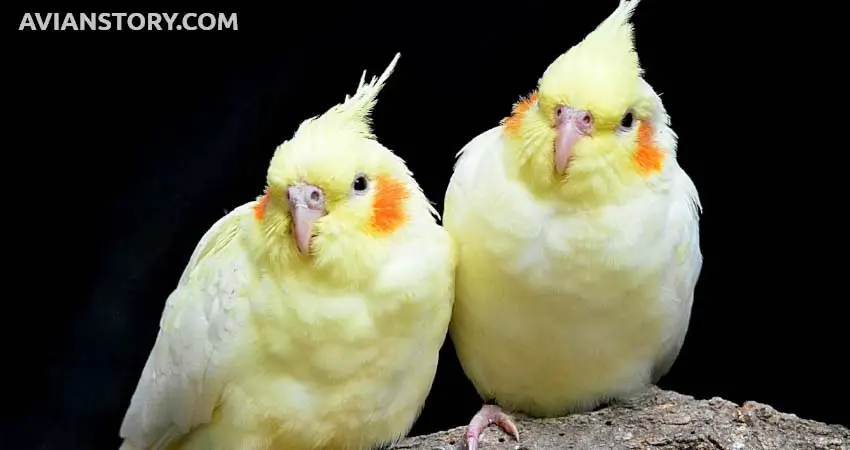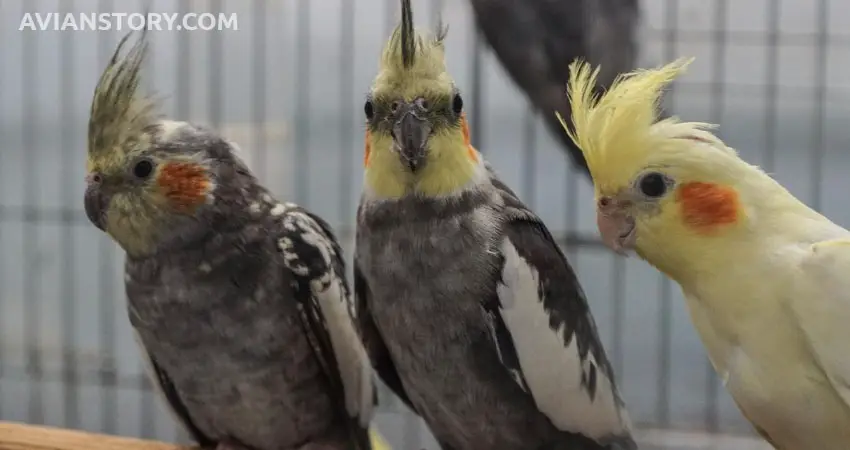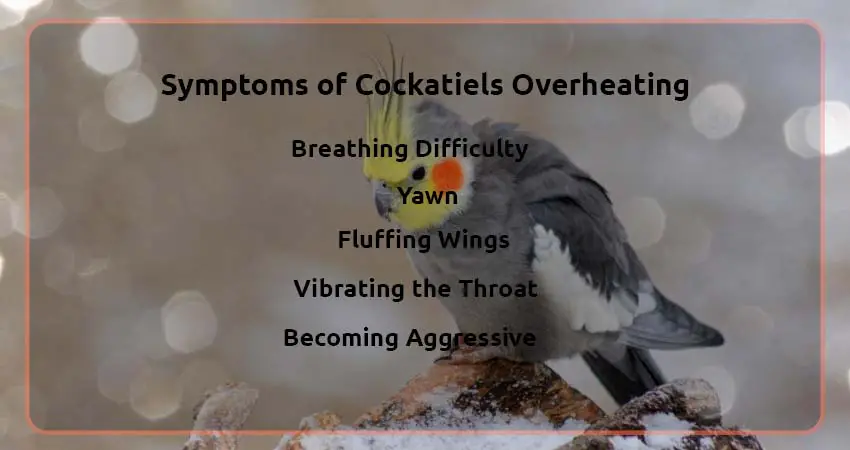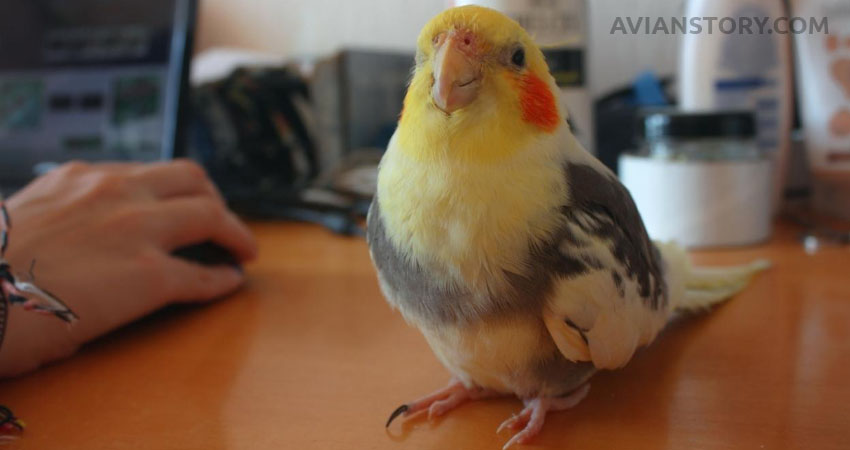What Temperature Is Too Hot for Cockatiels?
Cockatiels are quite sensitive to heat and can easily become overheated. When the temperature outside or in their environment gets too hot, cockatiels will start to pant, and their breathing will become rapid. If you see your cockatiel doing this, it’s essential to take steps to cool them down immediately.
So, what temperature is too hot for cockatiels? The ideal temperature in a cockatiel’s room should be between 70 and 75 degrees Fahrenheit. Cockatiels come from hot climates, but that doesn’t mean they can tolerate high temperatures.
This article will discuss the importance of maintaining this temperature range for your cockatiel’s health and well-being.
What Temperature is Too Hot for Cockatiels?

So, what temperature is safe for cockatiels? Cockatiels are a tropical species of bird, hailing originally from Australia. As such, they are used to warm weather and require a temperature between 70-75 degrees Fahrenheit to feel comfortable.
However, cockatiels can tolerate temperatures up to 90 degrees Fahrenheit for short periods without suffering ill effects. If the temperature exceeds 90 degrees Fahrenheit, cockatiels can become overly stressed and may even die. Therefore, ensuring that your cockatiel’s environment does not get too hot is important. At these high temperatures, cockatiels can become dehydrated and overheat.
Signs that your cockatiel is too hot include panting, lethargy, and weakness. If you think your cockatiel is too hot, immediately move them to a cooler location and give them water to drink. You should also contact a vet as soon as possible.
How Do I Keep My Cockatiel Cool In The Summer?
As the weather heats up, you may be wondering how to keep your cockatiel cool. Here are a few tips to help your feathered friend stay comfortable in the summer heat.
- Make sure your cockatiel always has a supply of clean, fresh water.
- Second, provide your cockatiel with plenty of fresh air by keeping the cage near an open window or door.
- Finally, give your cockatiel some relief from the heat by giving him a cool bath. Just add a few inches of lukewarm water to the sink or tub and let your bird enjoy a refreshing dip.
Temperature That Cockatiels Can Withstand

Cockatiels can withstand heat above 104 degrees. However, this doesn’t mean it’s good for their health. The ideal temperature range for cockatiels is between 70 and 75 degrees Fahrenheit.
Anything above or below this range can be injurious to their well-being.
Is 80 degrees too hot for a cockatiel? The answer is not necessarily be counted as too hot. However, above 90 degrees Fahrenheit, cockatiels can start to experience heat stress, which can lead to dehydration and eventually death.
So while they may be able to withstand high temperatures for a short period, keeping them in hot conditions for extended periods is not advisable.
Symptoms of Cockatiels Overheating

As pet owners, it’s our responsibility to learn the signs of overheating in our animals. For cockatiels, this is especially important because they are very susceptible to heat stroke.
Breathing Difficulty
Cockatiels are susceptible to overheating and can experience sharp increases in internal body temperature. This can cause difficulty breathing and other symptoms.
If you think your cockatiel room temperature Celsius is high, look for signs such as panting, increased heart rate, lethargy, and weakness.
When you see any of these signs, move your bird to a cooler location and provide fresh water. Monitor your cockatiel closely and contact a veterinarian if its condition does not improve.
Yawn
When the room gets too warm, your cockatiel will start to yawn. This is one of the symptoms of overheating in cockatiels. If your bird starts to pant or move less, these are also signs that the temperature is too hot for them.
You can help your cockatiel by moving them to a cooler area and giving them cool water to drink. You should also avoid putting them in direct sunlight or in front of a fan. If you think your cockatiel is overheating, take them to the vet immediately.
Fluffing Wings
If your cockatiel is persistently fluffing its wings, it may be overheating. Other symptoms of overheating in cockatiels include holding the wings away from the body. If your cockatiel is showing any of these symptoms, move it to a cooler location. Overheating can be fatal to cockatiels, so taking action as soon as you see any signs of it is crucial.
Vibrating the Throat
Cockatiels are prone to overheating, especially in hot weather. The overheating is the cause of your cockatiel’s throat seeming to be vibrating or rushing. The best way to cool down a cockatiel is to mist it with water or put it in a cool room. If the cockatiel is panting heavily, you can also place a wet towel on its back.
Becoming Aggressive
If you have a cockatiel, you may be used to its cheerful singing and friendly demeanor. However, cockatiels can also become aggressive, and this behavior is often a sign that the bird is too hot. Overheating can be caused by several factors, including being in a drafty room or being placed near a heat source.
When it’s hiding in the Shade

If you have a cockatiel, it’s important to be aware of the symptoms of overheating and what is the best room temp for a cockatiel. One symptom is hiding in the shadow.
If you notice your cockatiel doing this, it’s important to take action to cool them down. But is 60 degrees too cold for cockatiels? Yes, it could be, and it’s quite important to maintain the proper temp for your cockatiels.
There are many other symptoms of overheating in cockatiels, so it’s important to be familiar with all of them. Heat stroke is a serious condition and can be fatal if not treated immediately.
When Your Cockatiels Become Suddenly Lazy
If you have a cockatiel, you may be familiar with their playful and active nature. However, you may also know that they are susceptible to heatstroke. If your cockatiel becomes suddenly lazy, it may be a symptom of overheating, and you should take action to cool them down immediately.
Overheating can occur when the temperature in their environment is too hot or if they are exerting themselves too much.
FAQ
We hope that it will help answer some of your questions in this FAQ section. Check the answers to keep your bird in a comfortable condition.
Are 90 Degrees Too Hot For Cockatiels?
90 degrees might be too hot for cockatiels. If it’s too hot for you, it’s probably too hot for your cockatiel. Heatstroke is a severe concern for birds, and cockatiels are no exception.
At What Temperature Does A Cockatiel Live?
Cockatiels usually live between 70 to 75 degrees Fahrenheit.
Final Words
If you are an owner of cockatiels, it is important to know what temperature is too hot for cockatiels. The bird’s body temperature should not exceed 105 degrees Fahrenheit. If the bird is panting heavily, has ruffled feathers, or appears to be weak, it is important to cool the bird down immediately and seek veterinary care.
Now you know the ideal temp, and you don’t have to ponder the question, will my cockatiel survive hot temps? We hope this article is going to be very helpful if you are an owner of cockatiels.
